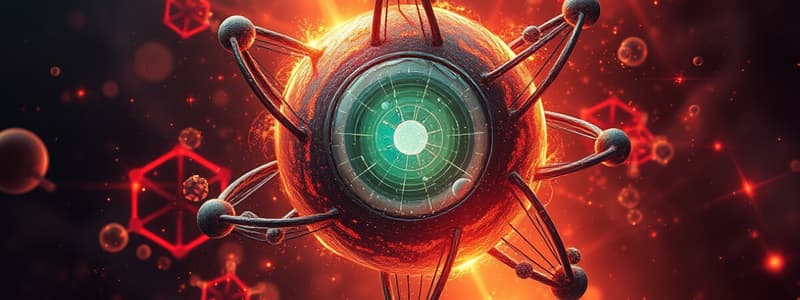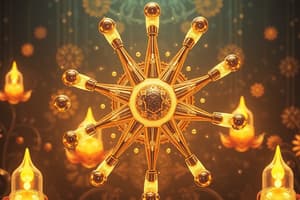Podcast
Questions and Answers
What are the two parts of an atom?
What are the two parts of an atom?
the nucleus and the electron cloud
Which argument best explains the charge of an atomic nucleus?
Which argument best explains the charge of an atomic nucleus?
An atomic nucleus is positively charged because it is composed of protons (which have a + charge) and neutrons (which are neutral)
Which statement describes an atomic nucleus?
Which statement describes an atomic nucleus?
An atomic nucleus contains most of the atom's mass and it contains protons and neutrons
What is the best description of the order of events in the animation titled 'Flying through an Atom'?
What is the best description of the order of events in the animation titled 'Flying through an Atom'?
Which statement best explains why the overall charge on an atom is zero?
Which statement best explains why the overall charge on an atom is zero?
How does an atom change if all of its electrons are removed?
How does an atom change if all of its electrons are removed?
What is the main difference between protons and neutrons?
What is the main difference between protons and neutrons?
What value is closest to the mass of the atom?
What value is closest to the mass of the atom?
What is most likely true of an atom with a mass of 15 amu?
What is most likely true of an atom with a mass of 15 amu?
The part of an atom that is mostly empty space is the
The part of an atom that is mostly empty space is the
The subatomic particle that has the least mass is the
The subatomic particle that has the least mass is the
A proton has ______ charge.
A proton has ______ charge.
What is the mass of a neutron?
What is the mass of a neutron?
Flashcards are hidden until you start studying
Study Notes
Structure of an Atom
- An atom consists of two main parts: the nucleus and the electron cloud.
- The nucleus is positively charged due to protons and contains neutrons, which are neutral.
Characteristics of the Nucleus
- The atomic nucleus houses most of the atom's mass.
- Protons within the nucleus carry a positive charge, while neutrons are uncharged.
Atomic Charge and Stability
- An atom maintains overall electrical neutrality because the positive charge from protons balances the negative charge from electrons.
- If an atom loses all its electrons, it becomes positively charged.
Protons and Neutrons
- Protons have an electrical charge, whereas neutrons do not possess any charge.
- The combined total of protons and neutrons defines the atom's mass; for example, an atom with a mass of 15 atomic mass units (amu) has a total of 15 protons and neutrons.
Mass and Composition of Atoms
- The mass of an atom is approximately 10 amu, indicating the scale of atomic mass.
- Neutrons have a mass of about 1 amu, while electrons are significantly lighter and are considered to have the least mass of all subatomic particles.
Electron Cloud
- The electron cloud is primarily empty space surrounding the nucleus.
- In "Flying through an Atom," a viewer experiences movement from the electron cloud, through the nucleus, and back into the electron cloud.
Charge of Subatomic Particles
- A proton has a positive charge, which is essential for understanding atomic interactions and stability.
Studying That Suits You
Use AI to generate personalized quizzes and flashcards to suit your learning preferences.




